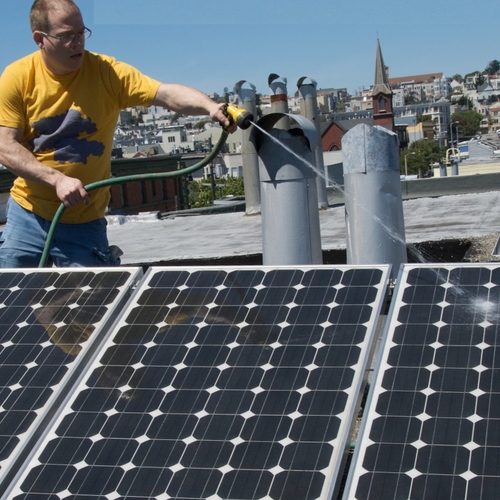
Image Credit: Warren Gretz / NREL
A White House budget plan for fiscal 2019 would shrink spending for the Department of Energy’s renewable energy and energy efficiency programs by more than 70%, The Washington Post reports.
The proposal, if approved intact by Congress, could mean sharp reductions in work at the National Renewable Energy Laboratory in Golden, Colorado, an important hub of renewable energy development that ultimately benefits U.S. homeowners. Most of NREL’s budget of $293 million a year comes from the DOE’s Office of Energy Efficiency and Renewable Energy, where spending would drop from $2.04 billion in the current year to $575.5 million.
The Post based its report on draft budget documents and said they reflect the administration’s ongoing efforts to shore up fossil fuels, including what the president has called “clean beautiful coal.” The White House unsuccessfully asked for similar budget cuts last year and didn’t get them, and Congress probably won’t go along with the latest requests, either.
But the president’s budget proposal, due out this month, will represent his opening gambit in talks with Congress and is an affirmation of White House policy and intent, The Post said.
The fate of the lab is an especially big deal in Colorado. The Daily Camera reported that NREL now employs 1,700 people. Had all of last year’s proposed budget cuts to energy programs been implemented, Colorado could have lost 2,830 research and science jobs and $1.5 billion in economic activity, according to Third Way, a Washington, D.C., based think tank.
Heather Lammers, a spokeswoman, said the lab wouldn’t “speculate on rumors prior to the release of the official budget.”
Energy Department spokeswoman Shaylyn Hynes said the administration believes there is a role for all fuels in the country’s energy mix, including renewables. Hynes said the department had awarded “hundreds of millions of dollars to solar and wind energy.”
NREL is but one of a number of programs that could see crippling losses of federal support. The Post said that the draft document seeks an end to the weatherization program and state energy grants. It would reduce spending on research for fuel-efficient vehicles by 82% and cut spending on solar technology by 78%. Money for efficient building technologies and research into geothermal, hydro, and wind also would be cut, the newspaper said.
Weekly Newsletter
Get building science and energy efficiency advice, plus special offers, in your inbox.













8 Comments
Donald Trump wants to repeat Ronald Reagan's mistake
As the Wikipedia entry for the National Renewable Energy Laboratory notes, "NREL began operating in 1977 as the Solar Energy Research Institute. Under the Jimmy Carter administration, its activities went beyond research and development in solar energy as it tried to popularize knowledge about already existing technologies, like passive solar. During the Ronald Reagan administration the institute's budget was cut by nearly 90%."
The effects of Reagan's cuts were devastating to the lab. Research projects were stopped in their tracks. Teams of researchers disbanded. Scientists scattered, looking for employment elsewhere. Cuts of this magnitude cause damage that takes years or even decades to correct.
Politics
I've tried not to engage in political discussions on the forum. But I'm genuinely interested in how people who profess to support green building can support the current administration.
Response to Stephen Sheehy
Stephen,
Few do.
The devastation won't be complete this time.
Even though the devastation will be severe for the NREL research teams, the fact is they've already won the energy competition.
Jimmy Carter thought the US energy crisis would be solved by exploiting coal, but the learning curve of renewables has been relentless (with some help from NREL), and it's now cheaper to build renewable power + battery storage than it is to build new fossil-burners (any fuel), even cheaper than just the operation & maintenance costs of half the coal fleet. See:
https://www.utilitydive.com/news/xcel-solicitation-returns-incredible-renewable-energy-storage-bids/514287/
Un-funding NREL means giving up some of the technical edge advantages the US has had of the emerging dominance of rewewables industry- it's a downright stupid policy (making America great again by giving up the advantage?), but it's not going to materially affect the rate of renewables implementation, and limits the chances of finding and capitalizing on any new breakthroughs in the technologies. No breakthrough is need for renewables to win- it's already past tense, but accelerating the learning curves where possible would always be welcome. Even if NREL goes away completely, renewables will not, and it's not a partisan issue- it's now well understood by just about everyone in the utility industry that it's a cheaper and more reliable way to go.
It would seem this administration is all about driving a modified DeLorean DMC-12 powered by flux capacitors, stuck in reverse.
@Stephen
Approx. 1/3 of the federal budget consists of non-discretionary spending (i.e. Medicare/Medicaid). Defense and Treasury (Interest on debt) come in second and third and although these two are technically discretionary from a political perspective they're not.
What remains of the budget that is subject to the chopping block is ridiculously small. Who knows what will happen, the article is reporting on a draft which will be altered numerous times and will probably fail in the end.
In any case the horse as left the barn as Dana has suggested so in the grand scheme of things it may not matter and the political winds will change yet again in a couple of months.
Perhaps what the NREL should've done is open locations in numerous congressional districts. It's what the military-industrial-complex does in order to discourage funding reductions.
On other thing is that I know the current Administration doesn't hold Colorado in high regard ever since they've opted to decriminalized & tax marijuana consumption. That doesn't bode well for the NREL.
source: http://federalbudget.com/
I like the idea but... @ John Clark
"Perhaps what the NREL should've done is open locations in numerous congressional districts."
NREL has only 1700 employees- it's a real pipsqueak of a department with a somewhat outsized public image.
1700 employees /435 congressional districts = almost 4 people per district.
Or, taking more partisan politics ratio:
1700 employees/248 congressional Republicans = almost 7 people per district.
(Not that all congressional Republicans are anti-renewables or anti-research- far from it! Some of the reddest of the red states have well established renewables industries, and are proud of it.)
Speaking as an employee, officer, board member & shareholder of a 6 person company, I can tell you that it's really hard to have very high profile in the average 700,000 person congressional district with a local organizations that size.
@Dana.
I agree.
Feb 12 "Trump seeks clean energy cuts"
https://www.washingtonpost.com/news/energy-environment/wp/2018/02/12/trump-moves-to-reshuffle-energy-department-priorities-with-2-billion-boost-to-nuclear-spending/?utm_term=.f03413da238f
Energy and Environment
Trump seeks clean energy cuts, $2 billion nuclear spending boost for Energy Dept.
By Steven Mufson and Chris Mooney February 12 at 5:03 PM
". . . the administration is asking for deep cuts elsewhere, especially in the agency’s Office of Energy Efficiency and Renewable Energy, which studies advanced transportation and wind and solar energy. The budget requests $696 million for that program, a 66 percent cut from the 2017 budget. That number includes $120 million added back after the recent two-year budget accord. The budget deal two weeks ago also meant that OMB restored $1.2 billion to science programs that would have been cut deeply . . . (the proposed budget) would restart the licensing of Nevada’s Yucca Mountain, a repository for spent fuel from nuclear power reactors across the country. . . It would abolish the Advanced Research Projects Agency . . ."
Log in or create an account to post a comment.
Sign up Log in